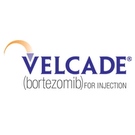Articles tagged with: Velcade
News»

For multiple myeloma patients, treatment history and personal predisposition have been identified as two key factors that may predict if a patient treated with Velcade (bortezomib) or thalidomide (Thalomid) will develop tingling and pain from nerve damage in their limbs.
Thalidomide and Velcade are among the many myeloma treatments that are neurotoxic, which means that they cause damage to the body’s nervous system. As a result, multiple myeloma patients commonly experience tingling and pain from nerve damage in their extremities as a side effect of treatment – this is called …
News»

A recent study in the Journal of Clinical Oncology reports that the combination therapy of Velcade (bortezomib), thalidomide (Thalomid), and dexamethasone (Decadron), commonly referred to as VTD, was successful at improving response and eliminating residual cancer cells in multiple myeloma patients after autologous stem cell transplantation (ASCT).
In ASCT, the patients’ own stem cells that were collected before high-dose chemotherapy are transplanted back into the patients. Most myeloma patients retain a small number of cancerous cells in their blood and bone marrow after ASCT. These cells are a major …
News»

A combination therapy of weekly Velcade (bortezomib), Doxil (pegylated liposomal doxorubicin), and dexamethasone (Decadron) led to a high response rate and moderate side effects in elderly patients with relapsed or refractory myeloma, according to a study published in the journal Clinical Lymphoma, Myeloma & Leukemia.
Previous studies have shown a complementary, additive relationship between Velcade and other drugs, such as Doxil and dexamethasone. However, a three-fold combination has never been evaluated in patients over the age of 70, even though 70 is the median age at diagnosis of multiple …
News»

Exposure to prior myeloma therapies, specifically thalidomide (Thalomid) and autologous stem cell transplants (ASCT), does not influence the superior efficacy of Velcade (bortezomib) compared to dexamethasone (Decadron) in patients with relapsed/refractory myeloma, according to an analysis published in the British Journal of Haematology.
Researchers had previously found that Velcade resulted in a better response rate, time to progression, and overall survival compared to dexamethasone in relapsed/refractory myeloma patients. Based on these results, Velcade has become one of the standard treatments for relapsed/refractory myeloma patients.
Previous trial results had also shown …
News»

The survival time of a multiple myeloma patient is strongly dependent on the patient’s age at diagnosis, according to a recent study published in the Journal of Clinical Oncology. The study, which evaluated the impact of age on disease outcome, compared the survival time (from diagnosis) between patients in different age groups and treatment regimens. Researchers also compared the life spans for patients with myeloma versus patients without myeloma.
Following diagnosis with multiple myeloma, the average survival time varies based on the type of treatment that a patient receives. For patients treated …
News»

A new study published in the journal Leukemia determined that when treated with Revlimid (lenalidomide) and dexamethasone (Decadron), relapsed and refractory myeloma patients with genetic risk factors experience lower response rates and shorter progression-free and overall survival durations.
Researchers also discovered that prior treatment with thalidomide (Thalomid) was associated with a decreased progression-free and overall survival.
Multiple myeloma patients with the chromosomal abnormalities del(13), t(4;14) or del(17p) are associated with a poorer prognosis in response to traditional chemotherapy. However, new drug and treatment options have the potential to overcome …
News»

The year 2009 brought a lot of new and exciting advancements in the field of multiple myeloma. Over the course of 2009, The Myeloma Beacon covered more than 100 important myeloma-related studies.
To highlight the most important of these studies, the Myeloma Beacon surveyed leading physicians and researchers in the field. These physicians and researchers were asked to name the three peer reviewed journal articles published in 2009 and the three conference abstracts from 2009 that have the most important findings or implications relating to multiple myeloma.
The top three journal …
